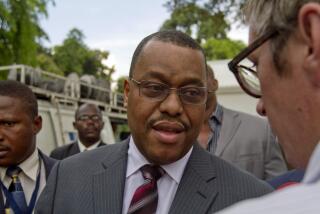No Sign of Compromise in First Talks on Haiti Crisis
- Share via
CARTAGENA, Colombia — Haitian President Jean-Bertrand Aristide and members of the military-supported regime that deposed him launched their first face-to-face negotiations here on Friday to try to solve Haiti’s political crisis.
Neither side appeared to have budged from its uncompromising position. But after their initial, one-hour meeting Friday evening, one negotiator described the talk as “positive.” (The discussions are scheduled to resume early today and last until Sunday.) That measured response offered a stark contrast to the sharp exchanges each side had offered earlier.
In Port-au-Prince, Prime Minister Jean-Jacques Honoret predicted, in an interview coinciding with the departure of the government negotiators, that there would be civil war if Aristide returned to Haiti--even if it were arranged through negotiations between the country’s legislature and the ousted president.
Honoret, a onetime human rights advocate, said he saw no chance for Aristide to reassume office because of resistance, not just from the military but from “the 500,000 people who are demonstrating” against him.
“It is not only the army you have to consider,” he said, adding that “Aristide’s followers are terrorists” who would stage a blood bath if he comes back. There would be a clash between the two sides, he said. “There is no other word for that except civil war.”
Josue Lafrance, a hard-line Haitian legislator who arrived for the talks here, predicted that there would be 1 million deaths in the civil strife that would erupt if Aristide returned to Haiti. “We are here to make sure that Aristide stays where he belongs--out of Haiti,” he said.
Aristide, arriving an hour later from his exile in Caracas, Venezuela, repeated his demand that, as a condition for his return, the country’s de facto leader, Brig. Gen Raoul Cedras, be ousted. “It is clear that a criminal like Cedras cannot keep doing what he is doing in the same post,” he said.
Aristide, Haiti’s first democratically elected president in recent memory, has accused Cedras of leading the Sept. 30 coup. Since Aristide was deposed, President Bush has suspended virtually all American trade with Haiti, although some U.S. humanitarian aid has been continued. America also has suspended its $85 million a year in assistance and has frozen Haitian assets in the United States.
The 34-nation Organization of American States has imposed an international trade embargo against Haiti that has cut off commerce and oil imports to the country. Since then, the prices of fuel and transportation have skyrocketed, causing intense hardship for most of Haiti’s 6 million people, already among the poorest in the hemisphere.
The embargo has contributed to an exodus of Haitians in flimsy vessels bound for the United States.
“We say clearly that the embargo must be maintained until we reach a solution that leads us to democracy,” Aristide said.
Still, recognizing the toll that the dispute is taking on their country, negotiators for both sides offered some conciliatory comments on Friday before the serious talks began.
“We have come here to meet our compatriots and to try to see what can be done in the sense of improving the Haitian national crisis,” said Duly Brutus, the senate president.
As for Aristide--whose followers in hiding in Port-au-Prince insist that only the dismantling of the army could assure his return and the resumption of what they said is true democracy in Haiti--he too vowed to negotiate seriously.
“We must listen and make concessions like all of those involved in the dialogue . . . in order to achieve unity,” said Aristide.
Times staff writer Freed reported from Port-au-Prince and special correspondent Yarbro from Cartagena, Colombia.
More to Read
Sign up for Essential California
The most important California stories and recommendations in your inbox every morning.
You may occasionally receive promotional content from the Los Angeles Times.












